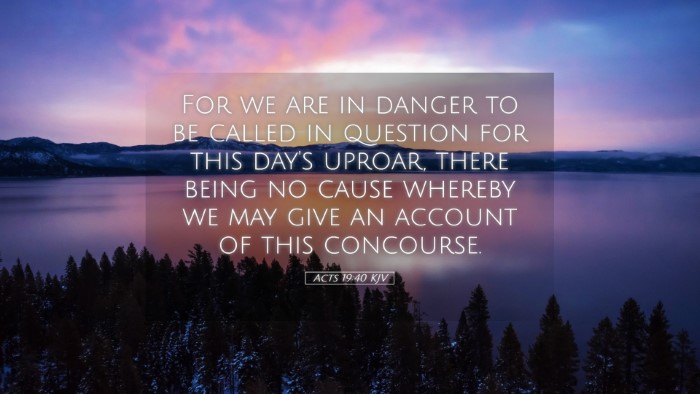Contextual Overview
Acts 19:40 falls within the narrative of Paul's third missionary journey. The events depicted in this chapter arise from the significant impact of Paul's ministry in Ephesus, particularly the spreading of the gospel and the resulting clash with local artisans and silversmiths, notably those who profited from the worship of Artemis.
The verse serves as a critical moment of intervention, indicating the potential legal repercussions arising from the riots instigated by Demetrius and his fellow craftsmen. The city's response to this uproar is pivotal for the early Christian movement and an essential study in understanding early church dynamics and civil authority.
Commentary Insights
Matthew Henry's Commentary
Matthew Henry highlights the chaos instigated by the silversmiths and notes the providential nature of the situation. He emphasizes that the uproar was much more than a local dispute; it was a spiritual battle against the encroachment of the Christian faith on idolatrous practices.
Henry further remarks that the city clerk's appeal to order and reason served as a reminder that civil authorities have a role in maintaining peace within the community. He perceives this as a divine intervention to protect Paul and the apostles from unjust punishment, noting that God often uses worldly leaders to fulfill His purposes.
Albert Barnes' Notes
Albert Barnes provides an exposition on the nature of the danger referred to in this verse. He explains that the uproar could easily lead to accusations of sedition against the Roman authorities, which was a serious charge in the Roman Empire. Barnes underscores that although there was no real basis for such accusations against the Christians, the potential for unrest and public disorder was significant.
Barnes stresses the wisdom of the city clerk, who sought to calm the crowd and redirect their fervor toward legal channels rather than mob justice. This appeal to legality and order reflects a broader theme on the relationship between the church and state regulations during the early church's formation.
Adam Clarke's Commentary
Adam Clarke expounds on the climactic nature of the events, stressing the role of the town clerk in defusing the situation. Clarke points out that the clerk's admonition indicates a keen awareness of the civil laws and the importance of not being undermined by tumultuous public sentiment.
Moreover, he elaborates on the term "this concourse," identifying it as a reference to the gathering of people whose motivations were driven by economic interests rather than genuine religious convictions. Clarke argues that the uproar was not deeply rooted in philosophical or theological grounds but rather in fear of economic loss.
Application for Pastors and Theologians
The reflections from these commentaries encourage pastors and theologians to consider the implications of conflict between faith and societal structures. The careful responses exhibited by both the apostles and the civil authorities provide a model for engagement and negotiation during times of unrest in contemporary settings.
Moreover, Acts 19:40 invites modern leaders to weigh the impacts of economic factors on faith communities. As the early church experienced opposition from the marketplace, modern churches must be equipped to engage in similar dialogues that center around the intersection of faith, commerce, and cultural practices.
Conclusion
In closing, Acts 19:40 serves as a profound reminder of the tension between civic duty and spiritual commitment. The insights derived from public domain commentaries highlight the importance of maintaining order and legality while upholding the core tenets of faith in the face of opposition. Within this framework, pastors, students, theologians, and scholars can systematically navigate the intricate relationships that exist between the church, society, and the economy, drawing lessons applicable to today's context.


